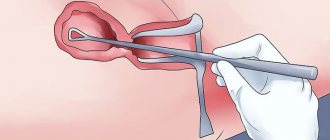When, at the most intimate moment, a woman leaves her vagina with a characteristic sound, a very awkward situation arises that destroys the romantic mood. If the relationship with your partner is not very close, this may cause his laughter or even disgust, and the partner will develop a psychological complex.
Gynecological specialists do not consider vaginal flatulence (there is even an English term for it “queefing”) a problem. If a couple cannot ignore vaginal farts, then there are many effective techniques to avoid uncomfortable situations associated with them.
Why is this happening?
Although the sounds from the vagina are very similar to those made by the anus when emitting gas, the physiological mechanism for these phenomena is different. Gases coming out “from the rear” are formed inside the body - in the intestines as a result of chemical processes of digestion of food and decomposition of undigested residues, which is why they have such an unpleasant odor.
Air enters the vagina only from the external environment, therefore, having accumulated inside the hollow uterus and coming out, it does not smell at all, only vaginal sounds are made.
How does air enter the female genital organ?
There are three main ways:
- in the process of intimate relationships;
- during simple physical activity;
- for certain diseases and after vaginal birth.
During sex, air is pumped into the vagina by the male penis in much the same way as into a hollow cylinder using a piston. When the internal volume is full, gases from the uterus come out, producing a kind of vaginal fart.
Some sexual positions are particularly conducive to the flow of air into the vagina - those in which the piston, i.e. The male penis enters and exits completely from the vagina. If there is a strong discrepancy in the size of the partners' genital organs (the vagina is much wider than the penis), the flow of air into the vagina during sex increases even more.
With age, and also after childbirth, air begins to escape from the vagina more often, which is associated with weakening of the intimate muscles (naturally, we are talking about vaginal childbirth, when the muscles of this group work especially intensively). This is a normal physiological process characteristic of muscle tissue.
In older women, not only during sexual intercourse, but even during normal activities with a slight load (for example, when walking), air is collected, accumulated, and then released from the vagina, accompanied by a characteristic “farting” sound, but without any odor. No matter how much she wants, a woman will not be able to hold him, because according to the anatomical structure of the vagina, unlike the anus, there is no sphincter.
In addition to psychological discomfort, a “farting” vagina can serve as a harbinger of serious problems with the uterus (even prolapse) due to increasing atrophy of the muscles of the pelvic organs, which, however, can be successfully prevented.
Why does air leave the uterus after childbirth?
Experts pay attention to the fact that air comes out of the vagina, and not from the uterus itself. Moreover, the main reason for this phenomenon is the entry of air into the vagina, no matter how strange it may sound. This happens, for example, while cycling, running or walking, as well as during any active movements. Then the air leaves the uterus with a characteristic sound.
One way or another, all representatives of the fair sex should understand that the most common reason for air entering the uterus is sexual intercourse. Moreover, during traditional sex, the likelihood of air being forced into the vagina is especially high, because during stimulation of its walls, its walls are stretched, and the piston acts as a kind of “piston”. Therefore, if air comes out of the vagina after sexual intercourse, then this is a natural phenomenon in which there is nothing strange.
If air leaves the uterus during intimacy, this causes the woman to feel discomfort. But the real problem appears when this happens during simple bending, getting up from the sofa, coughing, etc. How, in this case, can we explain the true cause of the sound coming from the woman? One way or another, the reason that air leaves the uterus after childbirth lies in the overstretching of the vaginal walls, as well as the muscles of the perineum.
It is recent childbirth that is the main cause of loss of tone in the pelvic floor muscles. That is, everything is explained by the weakness of the ligamentous apparatus in the uterus with a weakening of the tone of the perineal muscles.
When you need a doctor
In rare cases, the cause of vaginal flatulence is hidden in serious diseases of the genital area. When gases emitted by the vagina begin to smell unpleasant, this means that they have been pumped into it from the rectum. They contain many intestinal bacteria. Such gases enter the female genital organ through small openings between the vagina and anus.
Such a fistula can exist in a woman from birth, or may also appear as a result of surgical interventions (for example, removal of hemorrhoids) or untreated intestinal diseases. This situation is quite serious, therefore, if a woman has a history of intestinal diseases, and unpleasant-smelling gases periodically come out of the vagina, you should definitely visit a doctor to prevent sad consequences for health.
Signs of early pregnancy
Pregnancy as a diagnosis
Pregnancy is a diagnosis, and diagnosis translated means “management tactics.” Indeed, pregnancy leaves an imprint on a woman’s entire body as a whole, since at this time intense changes occur in all organs and systems of her body.
In addition, pregnancy is a contraindication for prescribing certain drugs, which is especially important for doctors of other specialties to take into account. During pregnancy (here, signs of pregnancy in the early stages before the delay are especially important, that is, the very beginning of a new life), fluorographic or any other x-ray examination, which can be prescribed to a woman, is contraindicated if it is not known that she is pregnant.
Therefore, timely detection of the fact of pregnancy is very important, since proper management of pregnancy from the earliest stages is the key to its successful completion - the birth of a living, viable child. Based on this, knowledge of the early signs of pregnancy is important both for the patient herself and for doctors of various specialties. This is exactly what will be discussed in our article.
Ideally, when preparing for pregnancy, you should start taking vitamins, since their deficiency cannot be compensated so quickly. And, of course, the sooner you find out about pregnancy, the better. But no matter how long it takes to figure this out, you must immediately start taking a special vitamin and mineral complex for pregnant women. After all, even if before this you did not eat very well and did not receive enough substances necessary for the health of the unborn child, now it is worth paying all your attention to this. When choosing, give preference to clinically tested drugs (not dietary supplements!) with a balanced composition - such as Vitrum Prenatal Forte. Taking it has been proven to reduce the risk of miscarriage and provide your
Source
How to avoid vaginal farts
If a woman experiences psychological discomfort from vaginal flatulence, or her man feels awkward in such situations, it is necessary to pump up the intimate muscles. There are several very effective exercises to give them proper tone:
- During normal urination, you can try to stop peeing two or three times by holding the flow of urine with your vaginal muscles. This trick should be done regularly, preferably every time you go to the toilet.
- Hold something heavy between your thighs and walk like this for 5-10 minutes. When performing this simple exercise several times a day, the muscles of the pelvic organs will noticeably tighten, which will make it difficult for air to enter the vagina and subsequent embarrassing “farts” from it.
You can solve the question of why air comes out of the vagina using organizational methods. To eliminate sounds from the uterus during sexual play, you need to choose a comfortable position and angle of entry of the penis into the vagina so that air leaves the vagina without noise. For example, positions where a woman lies upside down or bends over are not recommended (including the favorite styles of “doggy style” and “inverted wheelbarrow”), it is advisable to give preference to the good old missionary position, “cowgirl” or “spoon”, since In this position, practically no air enters the vagina.
An experienced partner, who does not want to embarrass a man by “farting” from her intimate place, before the act of love will lie on her back, spreading her legs to the sides, and thoroughly knead her stomach to release the accumulated air.
Don’t discount the famous Kegel exercise – periodically tensing the muscles of the intimate area. However, it is necessary to ensure that it is the vaginal muscles that are tensed, and not the stomach or thighs, otherwise, instead of a pleasant tone, we will get fatigue and aching muscles.
How to get rid of it?
Traditional and folk medicine knows a lot of recipes that remove vaginal flatulence:
- Sex. The sounds may disappear if you use an estrogen-containing lubricant. It should be used 2-3 hours before sexual intercourse. The problem can also be solved well by applications inserted into the vagina.
- Postpartum period. In order for the vagina to become silent, women who have given birth need to restore the lost tone to the pelvic muscles. Special squats help with this (more on them below).
- Aging. Older women face not only weakening of the pelvic muscles, but also prolapse of the uterus. One of the symptoms of this problem is vaginal flatulence. To prevent the uterus from prolapse, you should start regularly doing special Kegel exercises designed to strengthen the muscle tone of the vagina.
Exercises to eliminate the problem
Here are the simplest, easy exercises:
- Compression and decompression. Slowly, gradually and simultaneously compress the muscles of the anus and vagina. Then we unclench just as slowly. Repeat 40 times a day for one month.
- Special squats. We place our feet shoulder-width apart and slowly squat. At the same time, we spread our knees in different directions. We don’t stand up, we sit with our knees apart as long as possible. We are gradually trying to increase the load. The exercise will help if you do it for 20-25 days.
- Sex and exercise. During intercourse, try to squeeze your partner’s “tool” as tightly as possible with the internal vaginal muscles, and then sharply relax them. You need to do this 4-5 times in a row.
Comment from a sexologist on a women's forum
I hasten to reassure those sufferers who complain about sounds from the vagina during sex. This is a normal phenomenon; for a harmonious couple it is generally a trivial situation. Is your partner embarrassed or, worse, laughing? This only speaks of his inexperience as a man, because he does not understand that this is just air, which he himself forced into the vagina. However, if he is dear to you and is like that, do intimate physical exercise: by increasing the tone of the vaginal muscles, you will also receive a bonus in the form of new sexual sensations for yourself and for him.
Read
Also:
- Kegel exercises for women
- Ways to narrow the vagina
- How to achieve the effect of a stretched vagina and what is it for?
- Why do you want sex before your period?
How to deal with this?
Having learned why air comes out of the vagina during sex, another question arises. How to deal with what is happening so as not to get into an awkward situation and not blush in front of your partner during sexual intercourse.
The most effective method of getting rid of the problem is to strengthen the muscles of the perineum and pelvic floor. This can be achieved through Kegel exercises and squats. The Kegel training technique is one of the most popular in the world among women of all ages. Exercises can be performed almost anywhere: at home, at work, during rest. They perfectly help to increase the elasticity of the vaginal walls, prepare them for childbirth, and also restore them in the postpartum period.
The exercises are performed as follows:
- take a deep breath;
- tense the muscles of the perineum for 10-15 seconds;
- gradually relax the muscles over a similar period of time;
- repeat the scheme 10-15 times three times a day.
Special squats can help cope with the problem of air escaping from the vaginal opening during sex. To perform them, you need to place your feet 50-60 cm wide with your toes turned to the sides. Then do a slow squat and stay in this position for a few seconds. To get a positive result, it is enough to do 15 squats three times a day.
When, at the most intimate moment, a woman leaves her vagina with a characteristic sound, a very awkward situation arises that destroys the romantic mood. If the relationship with your partner is not very close, this may cause his laughter or even disgust, and the partner will develop a psychological complex.
Gynecological specialists do not consider vaginal flatulence (there is even an English term for it “queefing”) a problem. If a couple cannot ignore vaginal farts, then there are many effective techniques to avoid uncomfortable situations associated with them.
Vaginal flatulence after menopause
There is usually some amount of air in the vagina, but women begin to notice vaginal gas at times when relatively large volumes of air become blocked and form cavities or bubbles, which then either gradually deflate or release air suddenly and all at once.
The escaping gas usually causes sounds that are hard to miss. These sounds are a result of the vibration of trapped air through the space of the vaginal canal. The sounds may be similar to those that accompany the release of gases during flatulence.
Menopause occurs in women around the age of fifty. This is a natural process that means a decline in reproductive function. The ovaries malfunction, estrogen synthesis decreases. Lack of the hormone causes the tone of the vaginal muscles, the elasticity of the walls gradually decreases, and dryness of the vaginal mucosa occurs. It is dryness in the vagina that is the main cause of vaginal flatulence in older women.
We invite you to familiarize yourself with vaginal hysterectomy and the course of the operation.
https://youtu.be/Rp55Y8O1Ntw
The period of menopause is due to the following symptoms:
- increased body temperature;
- depression;
- withering of the skin;
- frequent urination;
- increased blood pressure;
- irritability;
- decreased libido.
Menopause is inevitable for every woman. Low estrogen levels during menopause and postmenopause are a natural physiological process.
Causes of vaginal farting
In order to understand where the air in the vagina comes from, let's talk a little about the physiological characteristics of this organ. If we compare it with the anus, the gases coming out of it are formed directly in the human body. These gases are produced by chemical reactions and are flammable. You can find out more information about this in the article - why people fart. But no gases are formed in the vagina. When you fart with your vagina, you fart with ordinary air; it has no smell, but only makes a characteristic sound when it comes out. Air enters the vagina from outside, over time it accumulates there and comes out, thus producing a fart.
Next, we will look at the three main reasons for air entering a woman’s vagina:
- During sex
- In everyday life
- Due to illness
Girl farts during sex
It happens that during sex a girl farts in her vagina. This can happen both during sex and after it. This is a fairly common phenomenon. Everything is very simple here, let's look at this fact from the point of view of physics. Imagine that the vagina is a cylinder and the penis is a piston. As a result of back-and-forth movements, the piston forces air into the vagina and, when there is an excess of it, it begins to come out. This does not always happen and not in all poses. If the piston comes out completely from the vagina, this will increase the air flow and is almost guaranteed to lead to a fart. If the partner's penis is too small compared to the woman's vagina or short, this also leads to increased air flow into the vagina during sex.
Some women have a very strong complex about this and are ashamed of it, which in turn prevents them from having a full sex life. Dear ladies, there is nothing scary or shameful about this, it’s just physics. It `s naturally. You shouldn't be ashamed of it. Women of all ages can fart with their vagina during sex. In older women and women who have given birth, this may also be due to weakening of the genital muscles.
It should also be noted that inexperienced men may misunderstand what is happening. Some people find this disgusting because they don’t understand that it’s just air that they themselves put in there. This only indicates his inexperience and nothing more.
Woman farts with vagina
Women can fart with their vagina not only during sex, but also in everyday life. This phenomenon rarely occurs in young people; older women are more susceptible to this. With age and after childbirth, a woman's genital muscles may weaken, resulting in air intake during movement. When air accumulates in a woman’s genital organ, it rushes out, making a characteristic sound. It is not possible to hold it, since, unlike the anus, the vagina does not have a sphincter.
The sound of a farting vagina can catch a woman at the most inopportune moment and put her in an awkward situation. As mentioned above, such a fart has no smell; it is not gases, but just air.
In principle, there is nothing wrong with this, but something needs to be done. But you can’t let the situation go, as this can lead to quite serious consequences. Atrophic muscles of the vagina and pelvis can lead to problems such as uterine prolapse.
Vaginal farting may be a signal that it is time to pay attention to the vaginal muscles. Below we will talk about how to deal with vaginal farts.
Vaginal flatulence due to disease
In rare cases, vaginal flatulence can be the result of quite serious diseases. Now we will talk about when gases from the rectum enter the vagina. Here we are no longer talking about odorless air, but rather about the gas emissions of our intestinal bacteria. This can occur when there is a fistula between the intestine and the vagina. The vagina and rectum are located in close proximity to each other. Such a disease can be either congenital or acquired, for example, as a result of complications of surgical interventions after the removal of hemorrhoids or other diseases of the rectum. A fistula between the rectum and vagina can occur as a result of untreated paroproctitis. This disease can cause not only gases to enter the vagina, but also serious consequences and infections. Therefore, if you have any diseases or ailments in the rectum, and this is accompanied by a farting vagina, the farts of which stink, then it is better to consult a doctor.
Vaginal fistulas (fistulas) and gases
Fistulas or fistulas occur when abnormal openings develop between two organs that should not anatomically be connected to each other. In particular, they can occur at times when scar tissue forms or disappears. Vaginal fistulas can cause vaginal gas.
Fistulas can develop between the vagina and other pelvic organs. The symptoms associated with fistulas depend on their size, location, and the organs affected.
Possible types of vaginal or vaginal fistulas include the following.
Vesicovaginal fistula (vesicovaginal fistula) is characterized by the development of communication between the vagina and the bladder.
At least three million women in developing countries have unresolved vesicovaginal fistulas. This condition is usually associated with complicated childbirth and injuries received during gynecological operations.
In developed countries, vesicovaginal fistulas are less common, although they still occur in 3-5% of cases of cancer of the vagina, cervix and uterus (endometrium).
The most common symptoms of vesicovaginal fistulas are abnormal watery discharge and regular urine leakage. Large fistulas can cause pain and discomfort.
A ureterovaginal fistula (uretero-vaginal fistula) occurs when a connection develops between the vagina and the ureter, a tubular structure that is usually located on both sides of the body and connects both kidneys to the bladder to further remove urine from the body.
Most uretero-vaginal fistulas result from injuries sustained during gynecological surgery, such as hysterectomy.
The most common symptoms of ureterovaginal fistulas are urine leakage from the vagina and abdominal discomfort.
A urethrovaginal fistula (urethrovaginal fistula) results from the development of an opening between the vagina and the urethra (urethra), a tube-like structure that connects the bladder to the outside of the body.
The most common symptom of a urethrovaginal fistula is regular leakage of urine from the vagina, which increases with pressure on the abdominal cavity.
An enterovaginal fistula (colovaginal or enterovaginal fistula) develops when an abnormal communication forms between the vagina and the small intestine.
This condition may result from abdominal and pelvic surgery or inflammatory bowel disease (IBD) such as Crohn's disease.
Symptoms of enterovaginal fistulas include abdominal pain and gas passing through the vagina.
A rectovaginal fistula (rectovaginal fistula) forms when an abnormal connection between the vagina and rectum develops.
This condition can have several causes, including:
- inflammatory bowel diseases, such as Crohn's disease or ulcerative colitis;
- prolonged or difficult labor;
- injuries during surgical procedures or postoperative complications such as infections;
- radiation (radiation) therapy of the pelvic organs;
- cancerous tumors.
The most common symptoms of a rectovaginal fistula are inflammation, gas or feces passing through the vagina, and a foul odor.
Colovaginal fistula (colic-vaginal fistula) is characterized by the development of an opening between the vagina and the colon.
This condition is rare and usually results from complications following pelvic surgery, including hysterectomy. Colovaginal fistula can also occur due to gastrointestinal diseases such as diverticulitis, Crohn's disease or ulcerative colitis.
The most common symptoms of a covaginal fistula include:
- passage or leakage of gas or feces through the vagina;
- foul-smelling vaginal discharge that may not be colored;
- numerous recurrent infections of the vagina and urinary tract;
- pain and inflammation in the area between the vagina, colon, and outer vaginal tissues during sexual activity.
Fistulas or fistulas occur when abnormal openings develop between two organs that should not anatomically be connected to each other. In particular, they can occur at times when scar tissue forms or disappears. Vaginal fistulas can cause vaginal gas.
The nuances of vaginal flatulence
Vaginal flatulence also depends on the individual structure of the vagina. The shorter and wider the cervix, the more air gets inside and, accordingly, is expelled.
The amount of air entering largely depends on the ratio of the sizes of the intimate organs of the partners. If the vagina is wide or its tone is weakened - which is often the case in women who have recently had childbirth or in those who have given birth several times - and the penis is short or not full enough, more air is pumped in.
Virgins often complain about sound luck. The hymen does not completely cover the entrance to the cervical canal - it necessarily has through holes through which menstrual blood exits. The atmospheric environment easily penetrates inside the body. Exit is difficult, so a certain amount of air accumulates in front of the hymen and with a sudden movement of the muscles it is pushed out. Of course, this process cannot happen silently. Most often this is how air leaves the uterus before menstruation.
Having analyzed the appearance of fart during coitus, women understand in which position it occurs more often and try to avoid it. The most problematic positions are those in which penetration is difficult - the “piston” enters with force, forcing air in - or, conversely, the vagina is completely relaxed. If you adjust the process, change postures, you can avoid an uncomfortable moment.
Gymnastics for intimate muscles
Many women are embarrassed to do Kegel exercises; they find them shameful.
Don’t break yourself - there are simple movements that help strengthen your intimate muscles:
- regular squats performed with hips spread - it is advisable to turn your knees to the sides during movements;
- interruption of the act of urination for a few seconds;
- tension in the vaginal muscles when you sit on a chair, completely relaxed.
Special Kegel exercises also consist of a complex during which the vaginal muscles are tensed and relaxed in various positions - standing, sitting or lying down.
In a lying position, the action should resemble pushing - that is, you need to try to control the intimate muscles in the complex - the vagina and uterus. At the same time, the abdominal press also tenses and relaxes, which is very useful. During the first sessions, you can help with your hands - with a little pressure on the uterus, the air will leave the body completely.
If this exercise is regularly performed before sexual intercourse, embarrassment can be avoided in the future.
Training the intimate muscles of the perineum with the help of weights is not Kegel gymnastics, but wumbling. This technique helps control the intimate muscles almost completely.
Air in the vagina
The vagina is a hollow organ that communicates directly with the external environment, like the mouth or anus.
But for some reason, no one is bothered by the fact that there is always air in the mouth, that it is periodically released when breathing, or with sharp sounds, sometimes by deliberately puffing out the cheeks, if it gets there during intense physical activity, for example, while running or lifting weights. Moreover, “you need to puff out your cheeks and suddenly release the air” is a favorite exercise when performing a skin tightening complex.
The anus is also a hollow organ and air enters there from the intestines, where it penetrates when swallowed from the external environment and is produced during the digestion of food. As a person matures, he learns to control the release of gases from the anus. There is a ring of muscle tissue around the anus - the sphincter, and its contraction can be controlled.
The vagina also contains air. It gets there from the external environment, from the intestines with a certain pathology - a fistula between the vagina and the large intestine. The pathology can be congenital, appear after a difficult birth, as a complication after surgery or inflammatory processes.
During sex, the intimate muscles tense and relax, and air is released accordingly. This is a natural process, it is not accompanied by sound in only 8% of women, and there is nothing shameful about it.
A woman is capable of controlling the muscles of the vagina during sexual intercourse - especially after appropriate training - but not of retaining air in it. This organ does not have a sphincter, so vaginal flatulence is not uncommon.
By the way, nature acted wisely. With vaginismus, the vaginal muscles sometimes contract spontaneously, and partners have to seek medical help to free them. If the sphincter muscles spontaneously contracted, the man’s genital organ would certainly be injured.
Possibility of solving a sensitive problem depending on the cause
Why does air come out of the vagina during sex? Where does it go if it is absorbed during sexual intercourse? The movements of the penis during coitus correspond to the movement of the piston; they pump air inside.
If the penis does not match the size of the vagina - it is too short or thin, then the amount of air entering the hollow organ increases.
Also, the volume of air increases when a woman has weak intimate muscles - which often occurs if she has not yet had time to recover from childbirth or pregnancy.
Vaginal dryness or weakening of the pelvic floor muscles, caused by age-related changes, also increase the possibility of fart, which is the name given to the noisy release of air from this organ.
4% of virgins complain of vaginal flatulence - in them this phenomenon is provoked by congenital dysfunction of the intimate muscles, pelvic floor muscles, and muscle hyperfunction.
With age, the question of why air comes out of the vagina after sex is asked by 37% of women. With natural age-related changes, the amount of estrogen produced decreases, and muscle tone decreases, which together causes luck.
To reduce the amount of air entering, it is necessary to use herbal remedies containing estrogen or special lubricants during sex. There are special intravaginal applications that help cope with the unpleasant condition.
Special Kegel exercises help strengthen the pelvic floor and vaginal muscles. They can be performed even in a public place - the tension in the intimate muscles is invisible to others.
Exercises do not help everyone; sometimes, due to prolapse of the uterus, uterine rings are installed in the vagina. They do not exclude air from entering during sexual intercourse or during increased loads while walking, but they make its expulsion silent.
During pregnancy, air from the vagina begins to come out with noise because this organ relaxes during pregnancy, and as birth approaches, it becomes softer and more elastic. This is how the body prepares for the complex process of childbirth.
During childbirth, during contractions and pushing, the intimate muscles contract constantly and capture air.
After childbirth, with complete relaxation, air comes out of the vagina - it needs to go somewhere. By the way, this phenomenon can occur twice, when, with the help of labor, the fetus is expelled, and then, during the expulsion of the placenta, the fetal membrane, and the umbilical cord.
Vaginal flatulence is not a pathology, it is a natural phenomenon. If no other symptoms - uterine prolapse, urinary incontinence - bother the woman, no treatment is required.
To reduce luck, it is enough to use special lubricants and perform special exercises.
An understanding and loving partner will not laugh at a natural phenomenon.
If a man jokes unsuccessfully, then you can always tell him that it is his fault that the sound occurs during sexual intercourse - the parameters of the genital organ are let down.
Just don’t forget about the emotional vulnerability of men. What a woman can turn into a joke can seriously hurt men and even lead to impotence.
If you love your partner, it is better to explain to him the inappropriateness of irony and choose poses in which luck rarely occurs.
As it turns out, girls can fart not only with their butts, but also with their vaginas. There are many myths and guesses surrounding this phenomenon. They are not always true. For some women, this causes a lot of discomfort, and they begin to regard it as a disease. In this article we will talk about this, we will talk about the reasons for letting air out of the vagina and how it happens.
Exercises to tone the vaginal muscles
The developed exercises maintain vaginal tone. Regular training will lead to the return of elasticity, reducing the likelihood that the air will completely escape from the uterus after childbirth. Squats with spread knees are performed for about two minutes. When urinating, they work with the perineum, periodically interrupting the stream of urine.
If air gets inside, it is necessary to work with the uterus and anus. To do this, pull in and relax the muscles. The exercise is performed regularly for at least three weeks. With their help, they get rid of the problem and enhance the pleasant sensations during sexual intercourse.
Perform the exercise on the floor. To do this, you need to sit down and stretch your legs. Move forward on your buttocks, tensing them, for 2–3 minutes. Lie on the floor and slowly perform the “birch” exercise. Supporting your back, spread your legs to the sides and return to the starting position. Lying on your back, spread your legs slightly bent to the sides. Lower and raise your pelvis for about a minute, and then relax for 10–15 seconds.
The primary muscles are retracted and compressed and remain in this state for about 10 seconds. Subsequently, increase this time to 5 minutes. Pay attention to breathing, without interrupting inhalation and exhalation. Training is carried out standing or lying down.
When conducting training, use a ball on a string. You can perform the exercise together with a partner. After introducing the element inside, the woman needs to work her muscles so that something will push the ball out. Start with 5 times and work your way up to 15.
It is necessary to strengthen the stomach and hips. This will allow the uterus to be affected. Once you feel that the exercises are easy to perform, you can increase the number of contractions. The result comes closer to the second month of classes.
The easiest way to exercise is Pilates. It is characterized by low intensity and minimal speed of exercise. In the process, the deep muscles are thoroughly worked out. When training the pelvis, you involve the natural support of movements, which stretches, strains the stomach and back. The stronger you do this, the greater the range of movements will be. You need to start with a simple set of exercises, squeezing the muscles moderately.
You can get rid of the unpleasant release of air from the vagina by doing exercises for a long time. With the help of complexes, the size of the vagina is reduced in 1-2 months and muscle tone is restored. This will avoid surgeries and medical interventions.
A very common female problem is when air leaves the uterus, especially after childbirth. This causes a certain discomfort, so that the woman begins to feel embarrassed about her relatives and friends. At the same time, the doctor rarely decides about the reasons for this condition of the uterus after an interesting situation.










